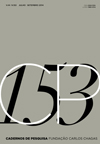Shift allocation and school segregation: discussing intra-school inequalities
Keywords:
School segregation, School shifts, Educational policyAbstract
The paper analyzes patterns of intra- and interschool segregation for the entire Rio de Janeiro, municipal school system from 2004 to 2010. The research design captures the “net effect” of “schooling in shifts/sessions, a mandatory distribution of pupils across morning and afternoon “shifts” or “sessions”. Segregation was assessed utilizing the Segregation Index considering four different pupil characteristics: poverty, color/race, parents’ education and age/grade distortion. The results indicate that “school shifts” increase the overall level of segregation and that the pupils are being consistently selected based on prior educational attainment, reinforcing the existence of “informal tracking” in Rio de Janeiro public schools.
Downloads
References
ALVES, Fátima; LANGE, Wolfram; BONAMINO, Alicia. A geografia objetiva de oportunidades educacionais na cidade do Rio de Janeiro. In: RIBEIRO, L. C. Q.; KOSLINSKI, M. C.; ALVES, F.;LASMAR, C. Desigualdades urbanas, desigualdades escolares. Rio de Janeiro: Letra Capital, 2010. p. 67-90.
BARTHOLO, Tiago Lisboa. Measuring between-school segregation in an open enrolment system: the case of Rio de Janeiro. Journal of School Choice, n. 7, p. 353-371, 2013.
BARTHOLO, Tiago Lisboa. Segregação escolar na rede municipal do Rio de Janeiro: Causas e consequências. Tese (Doutorado) – Universidade Federal do Rio de Janeiro, Rio de Janeiro, 2014.
BRITO, Márcia; COSTA, Marcio. Práticas e percepções docentes e suas relações com o prestígio e clima escolar das escolas públicas do Município do Rio de Janeiro. Revista Brasileira de Educação, Campinas, v. 15, n. 45, p. 500-510, set./dez. 2010.
BRUEL, Ana Lorena; BARTHOLO, Tiago Lisboa. Desigualdade de oportunidades educacionais na rede pública do Rio de Janeir o: transição entre segmentos do ensino fundamental. Revista Brasileira de Educação, Campinas, v. 17, n. 50, p. 303, maio/ago. 2012.
CAVALLIERI, Fernando; LOPES, Gustavo Peres. Índice de Desenvolvimento Social – IDS: comparando as realidades microurbanas da cidade do Rio de Janeiro. Rio de Janeiro: Instituto Pereira Passos, 2008. (Estudos Cariocas, n. 20080401).
COSTA, Marcio. Prestígio e hierarquia escolar: estudo de caso sobre diferenças entre escolas em uma rede municipal. Revista Brasileira de Educação, Campinas, v. 13, n. 39, p. 455-469, nov./dez. 2008.
COSTA, Marcio; KOSLINSKI, Mariane. Quase-mercado oculto: a disputa por escolas comuns no Rio de Janeiro. Cadernos de Pesquisa, São Paulo, v. 41, n. 141, p. 246-266, jan./abr. 2011.
COSTA, Marcio; KOSLINSKI, Mariane. Public schools: choice, strategy and competition. Pró-Posições, Campinas, v. 23, n. 2,
p. 1-19, maio/ago. 2012.
COSTA, Marcio; PRADO, Ana; ROSISTOLATO, Rodrigo. Talvez se eu tivesse algum conhecimento...: caminhos possíveis em um sistema educacional público e estratificado. Interseções, Rio de Janeiro, v. 14, p. 165-193, 2013.
EUROPEAN GROUP FOR RESEARCH ON EQUITY IN EDUCATIONAL SYSTEMS. Equity in European educational systems: a set of indicators. European Educational Research Journal, v. 4, n. 2, p. 1-151, 2005.
GORARD, Stephen. Who is eligible for free school meals? Characterising FSM as a measure of disadvantage in England. British Educational Research Journal, v. 38, n. 6, p. 1003-1017, Dec. 2012.
GORARD, Stephen; SEE, Beng Huat. Overcoming disadvantage in education. London: Routledge Falmer, 2013.
GORARD, Stephen; TAYLOR, Chris; FITZ, John. Schools, markets and choice policies. London: Routledge Falmer, 2003.
HAAHR, Jens Henrik; NIELSEN, Thomas Kibak; HANSEN, Martin Eggert; JAKOBESEN, Soren Teglgaard. Explaining student performance: evidence from the international PISA, TIMSS and PIRLS surveys. DanishTechnological Institute, 2005. Disponível em: . Acesso em: 30 mar. 2013.
HARKER, Richard; TYMMS, Peter. The effects of student composition on school segregation. School Effectiveness and School Improvement: An International Journal of Research, Policy and Practice, v. 15, n. 2, p. 177-199, June 2004.
HARRIS, Richard. Local indices of segregation with application to social segregation between London’s secondary schools. Environment and Planning, v. 44, p. 669-687, Aug. 2011.
RIBEIRO, Luis Cesar; KOSLINSKI, Mariane. A cidade contra a escolar? O caso do Município do RJ. Revista Contemporânea de Educação, Rio de Janeiro, v. 4, p. 351-378, 2009.
RIBEIRO, Luis Cesar et al. Desigualdades urbanas, desigualdades escolares. Rio de Janeiro: Letra Capital, 2010.
ROSENTHAL, Robert; JACOBSON, Lenore. Pygmalion in the classroom: teacher expectation and pupils’ intellectual development. New York: Holt, Rinehart & Winston, 1968.
SAPORITO, Salvatore. Private choices, public consequences: magnet school choice and segregation by race and poverty. Social Problems, v. 50, n. 2, p. 181-203, 2003.
WILSON, William. The truly disadvantaged: the inner city, the underclass and public policy. Chicago: University of Chicago Press, 1987.
YORKE, Mantz. Analysing existing datasets: some considerations arising from practical experience. International Journal of Research & Method in Education, v. 34, n. 3, p. 255-267, 2011.
Downloads
Published
How to Cite
Issue
Section
License

This work is licensed under a Creative Commons Attribution-NonCommercial 4.0 International License.
Authors who publish in this journal agree to the following terms:
a. Authors retain the copyright and grant the journal the right to first publication, with the paper simultaneously licensed under the Creative Commons Attribution license that allows the sharing of the paper with acknowledgment of authorship and initial publication in this journal.
b. Authors are authorized to assume additional contracts separately, for non-exclusive distribution of the version of the paper published in this journal (for example publishing in institutional repository or as a book chapter), with acknowledgment of authorship and initial publication in this journal.
c. Authors are allowed and encouraged to publish and distribute their paper on-line (for example in institutional repositories or on their personal page) at any moment before or during the editorial process, as this can generate productive changes, as well as increase the impact and citation of the published paper (See The Effect of Open Access).









